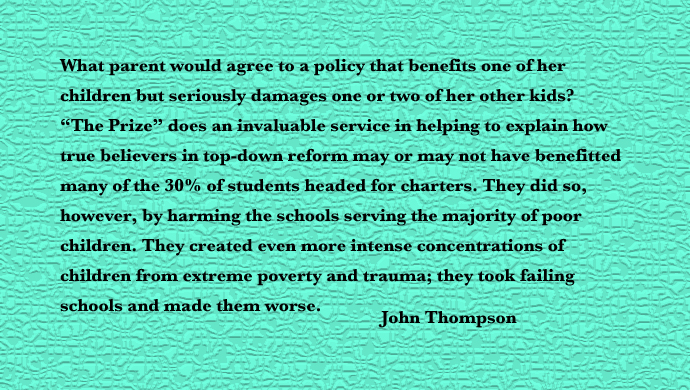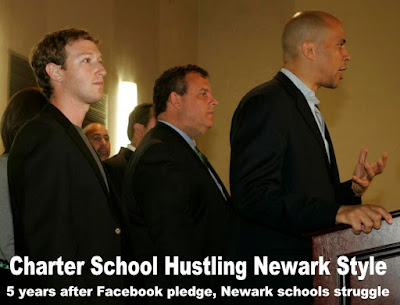Will Reformers Learn a Lesson From Newark?

By John Thompson.
When Dale Russakoff conceived of The Prize, she “viewed education reform from a distance but as a movement full of promise.” She was eager to follow the story of Mark Zuckerberg’s $100 million matching gift to the Newark schools. The subtitle, “Who’s in Charge of America’s Schools?,” gets to Russakoff’s main point.
The best thing about The Prize is that it is an objective analysis of one of the nation’s most prominent corporate school reform failures. And, it comes at great time. Even after the repudiation of Michelle Rhee inWashington D.C and John Deasy in Los Angeles, edu-philanthropists in love with test, sort, reward, and punish plan to create so many charters in those two cities that it would leave the rest of their schools and unions in ruins. Anyone who reads Russakoff’s balanced narrative about the way that Cory Booker, Chris Christie, Christopher Cerf, Cami Anderson and other corporate reformers squandered the $200 million fund that Zuckerberg made possible, will understand that the new assaults are the same as the old ones. They will cause more harm than good for students, and leave the teaching profession and their cities’ public education in tatters.
Mark Weber, “The Jersey Jazzman,” criticizes the way that reviewers ranging from Conor Williams to Joe Nocera cite The Prize. But, Williams writes for The 74, which spins anything and everything as evidence that teachers unions must be destroyed. I’m more struck by Nocera’s New York Times review of Russakoff’s book. He doesn’t come completely over to the side of teachers who oppose market-driven, test-driven reform, but Nocera comes much closer with his critique of One Newark:
It’s great for the 30 percent who are learning from charter school teachers. But as Russakoff puts it in the most poignant line in her book, “What would become of the children left behind in district schools?”There is another way to approach reform, a way that includes collaboration with the teachers, instead of bullying them or insulting them. A way that involves the community rather than imposing top-down decisions. A way that allows for cross-pollination between charters and traditional public schools so that the best teaching practices become commonplace in both kinds of schools.
I no longer believe that cross-pollination between charters and neighborhood schools is likely. I also suspect that Russakoff (and Nocera) would not agree with my position on seniority – that we must mend it, but not end it. And some may believe she is too critical of collective bargaining contracts that defend the due Will Reformers Learn a Lesson From Newark? - Living in Dialogue:


